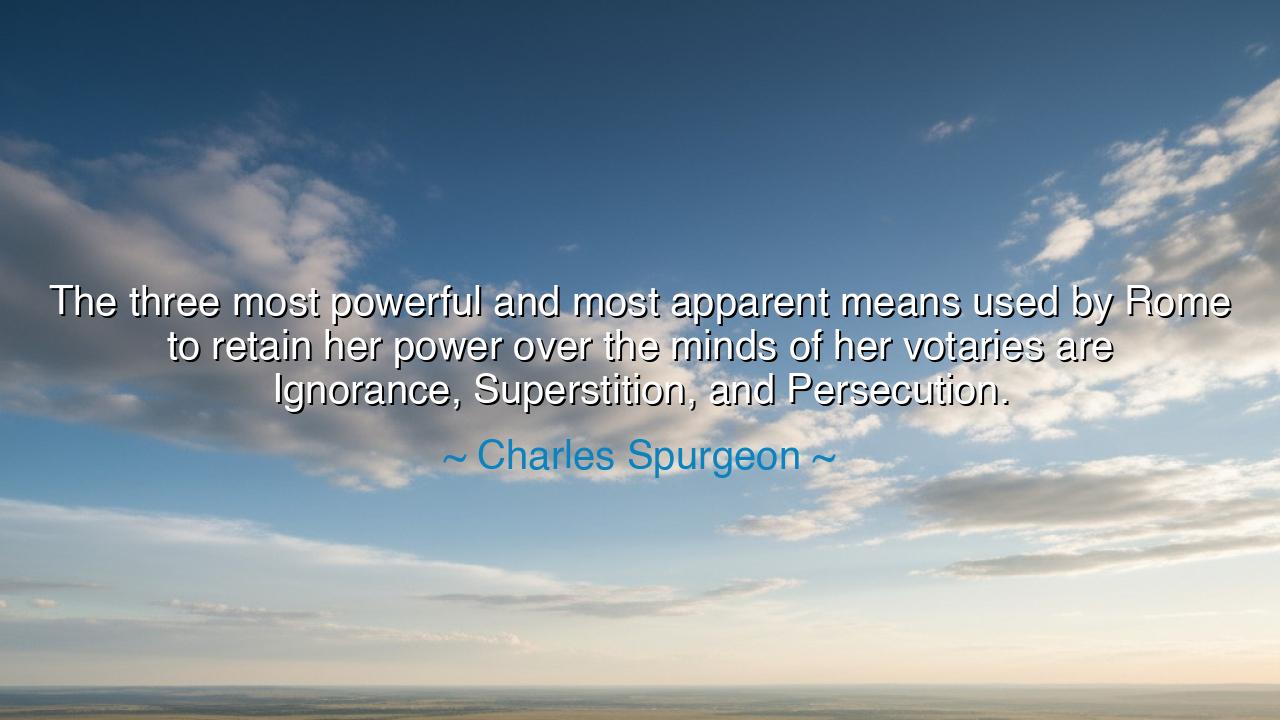
The three most powerful and most apparent means used by Rome to
The three most powerful and most apparent means used by Rome to retain her power over the minds of her votaries are Ignorance, Superstition, and Persecution.






Hearken, O children of discernment, to the words of Charles Spurgeon, who unveils the mechanisms by which power can dominate the hearts and minds of men. He declares that the three most potent and visible instruments employed by Rome to maintain its sway over the faithful were Ignorance, Superstition, and Persecution. Herein lies a teaching for the ages: the mind, unilluminated and unguarded, is vulnerable to manipulation, and only through vigilance, knowledge, and courage may freedom of conscience endure.
The origin of this reflection lies in Spurgeon’s life as a preacher and moral philosopher of the nineteenth century, one devoted to the defense of faith and the clarity of understanding. Observing the histories of church and state, he discerned that authority often sustains itself not through reason alone, but by obscuring truth, instilling fear, and punishing dissent. These three instruments—ignorance, superstition, and persecution—operate together to bind the soul, suppress inquiry, and perpetuate control over the hearts of the people.
The meaning of this aphorism is profound: knowledge is the sword against oppression, discernment the shield against falsehood, and courage the lamp that illuminates the path of freedom. Ignorance blinds, superstition enslaves, and persecution terrorizes; together they forge chains invisible yet heavy. Spurgeon warns that vigilance and education are necessary to resist such domination, and that faith unexamined may itself be a tool of subjugation.
History provides vivid testimony to this teaching. Consider the struggles of the early Protestant reformers, who challenged the dominance of Rome not through violence alone, but through the dissemination of knowledge and the questioning of superstition. Figures like Martin Luther risked persecution to illuminate truths obscured by ritual and authority, revealing that the human spirit, armed with understanding, can pierce the veil of control and reclaim its freedom.
Moreover, this lesson extends beyond the annals of church and state. In every society, those who wield influence may employ subtle ignorance, superstition, and fear to maintain obedience. Spurgeon’s insight reminds all generations that the soul must cultivate discernment, question inherited beliefs, and act with courage in the face of coercion. True freedom arises not from the mere absence of restraint, but from the active pursuit of knowledge, virtue, and moral clarity.
O generations yet unborn, take this counsel into your hearts: guard against the chains of ignorance, resist the seduction of superstition, and face persecution with courage, for in doing so the mind is liberated, and the soul attains wisdom and integrity. Let history guide you, let discernment be your constant companion, and let the light of knowledge pierce every shadow that seeks to bind your spirit.






HDNgan Ha Doan
This statement makes me reflect on the role of fear and ignorance in shaping societal structures. Were people genuinely convinced by superstition, or did the threat of persecution force compliance? I also wonder about the implications for personal agency—can individuals maintain independent thought in the face of systematic control? Moreover, does recognizing these strategies help us understand historical and current patterns of power, and how can society prevent similar abuses in the future?
LLinh
I find this perspective provocative because it frames control as a psychological and spiritual endeavor, not just political. How much of Rome’s success depended on these methods versus military or economic strength? It also prompts reflection on modern parallels: are there contemporary institutions or governments using subtle forms of superstition or misinformation to influence public perception? This makes me question the boundaries between tradition, faith, and manipulation in shaping human behavior.
NHHong Nhung Hoang
This quote invites me to consider the ethics of authority and influence. Can power be maintained without manipulating belief and suppressing dissent, or is coercion inevitable in large institutions? It also makes me question how education, transparency, and open debate serve as countermeasures to these mechanisms. Does awareness of such strategies empower individuals to think independently, or are they so deeply embedded in culture that resistance requires conscious effort and courage?
MQTran Nguyen Minh Quan
Reading this, I’m struck by the interplay between power and belief. How does the use of ignorance and superstition shape collective behavior, and can persecution reinforce ideological loyalty? I also wonder whether Spurgeon’s perspective reflects a purely historical analysis or a moral judgment. Are these tactics unique to Rome, or are they patterns that recur across civilizations whenever authority seeks to dominate minds?
TMtran my
This statement makes me reflect on the mechanisms of control and influence in history. Were ignorance, superstition, and persecution effective because people were willing participants, or were they imposed through fear and manipulation? It also raises a broader question: do these tools still exist in modern contexts under different guises, such as propaganda or misinformation? I’m curious about how societies can resist such forms of control and cultivate critical thinking instead.